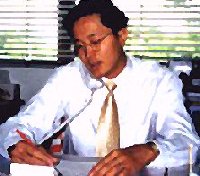
Interconnectivity: Dr Henry Yeung in action.
|
Interconnectivity: Dr Henry Yeung in action. |
The contour lines of Dr Henry Yeung's road map run far and wide. They are in fact, transnational. An Assistant Professor with the Department of Geography, Dr Yeung specialises in geography of international business. He has recently written an executive report on Singapore's Global Reach (http://courses.nus.edu.sg/course/geoywc/henry.htm) based on a research project funded by NUS. The research which offers insights into the workings of Singapore-based transnational corporations, involved interviews with top executives from 204 Singapore-based firms and 56 of their subsidiaries in Hong Kong and China. These include private companies, public listed and government-linked companies. About 41% of these have an annual turnover of at least $50 million and are generally high-value added manufacturers or service providers.
"The research looks into how local companies invest overseas, their mechanisms and strategies. We have also recommended solutions to the problems they encounter. In doing so, we also hope to play a bridging role between policy makers and the entrepreneurs," said Dr Yeung. Though business globalisation may seem the territory of business studies, geography plays a significant role too, said Dr Yeung who recently gave a talk on Singapore's Global Reach: The Globalisation of Singaporean Firms,or ganised by the Department of Business Policy. "We need to better educate our students the importance of appreciating the geographical complexity of our world in which venturing abroad is both exciting and risky. These aspects of transnational entrepreneurship need to be ingrained in the mindset of our students through a syllabus sensitive to the differences of the geographical world we live in," said Dr Yeung.
The survey was conducted through face-to-face interviews by the research team. Besides top executives in Singapore, Dr Yeung also personally interviewed 56 others in Hong Kong and China. They were taped, duration ranging from one hour to several hours. According to the findings, a common major strategy was using local partners and personal contacts to set up their overseas operations. As many countries in Asia do not have a transparent business environment, reliance on local partners and personal contacts becomes extremely important to minimise risks, Dr Yeung explained.
The research team also found out that the main driving force for the global drive is market presence - reaping the advantages of being located in important growth regions in the industry. An interesting observation made by Dr Yeung, was that Singapore businessmen were already in China way back in the 70s - even before Singapore's drive to expand industrially into China in the 90s. "This sort of dispel the belief that Singaporeans are reluctant to work overseas," he said.
Dr Yeung also observed that all his interviewees were proud of their Singapore citizenship. "Some Singaporeans have been away from home for about 40 years and they have never thought of changing their citizenship," he said.
Late starter in geography
A geography teacher once told Dr Henry Yeung that for those who have not done well, wait a while. It's just a matter of realising their potentials a little later. Today, the teacher is no doubt pleased that Dr Yeung has proven his hypothesis true - and Dr Yeung was very glad that he has held on to the teacher's words of optimism.
"Although I was interested in geography, I did not do well in the subject," said Dr Yeung who grew up in China and Hong Kong. Despite getting a C for A-level Geography, he was determined to read the subject when he was awarded a scholarship by the Singapore Government to study at NUS. His high school teacher's comment came true. He was a "late bloomer". Not only was he top student in the subject each year, he also graduated with first-class honours in 1992. He then did his PhD at the University of Manchester, returning to NUS to join the academia in 1995. "Unlike other jobs, there is no retirement in this line. I can carry on working and doing my research till the day I die," he said.
Dr Yeung won the NUS Outstanding University Researcher Award and the Institute of British Geographers Economic Geography Research Group Best Published Paper Award in 1998. His works on transnational corporations from developing countries, in particular Hong Kong and Asian Newly Industrialised Economies have been published widely, including his research papers in more than 30 internationally-refereed journals. He has also written and edited four books. He also maintains a most interesting homepage at: http://courses.nus.edu.sg /course/geoywc/henry.htm®